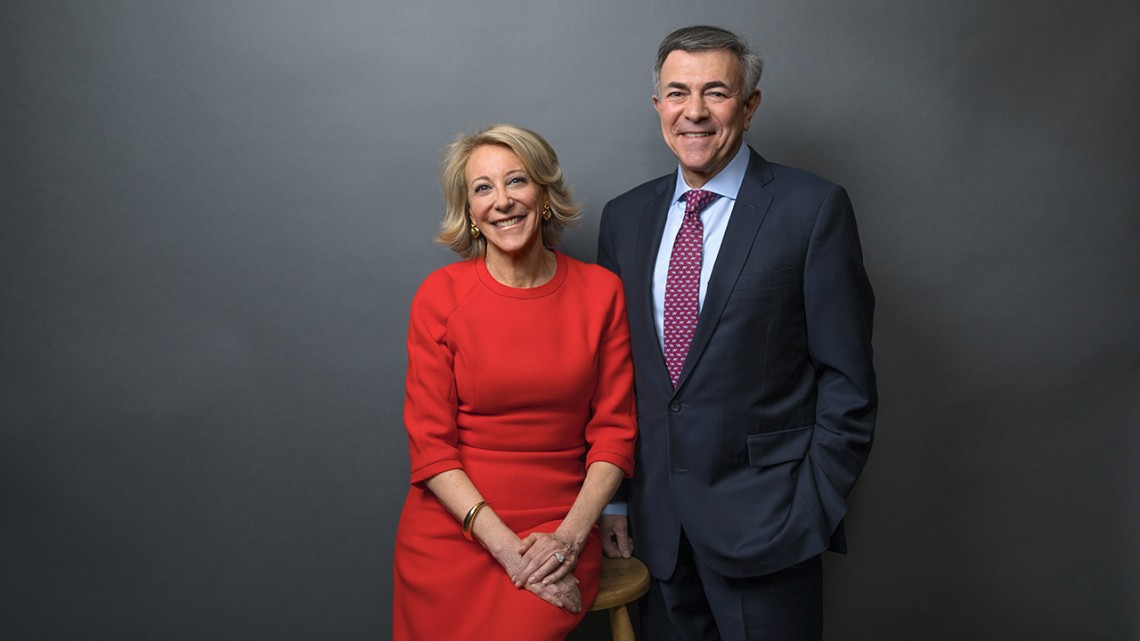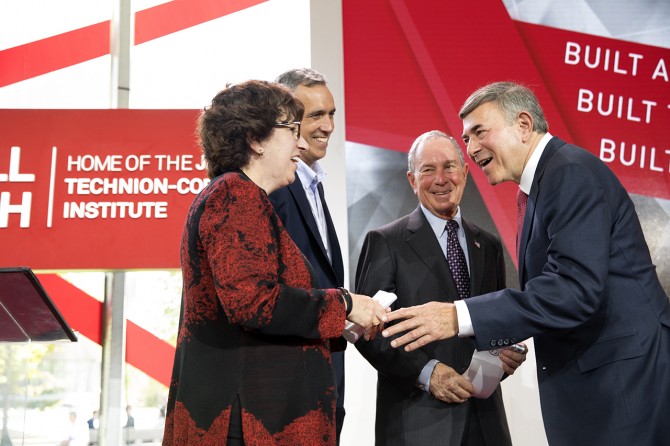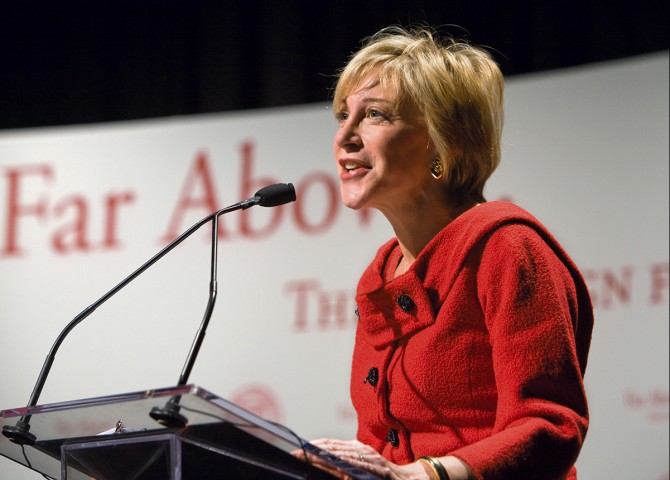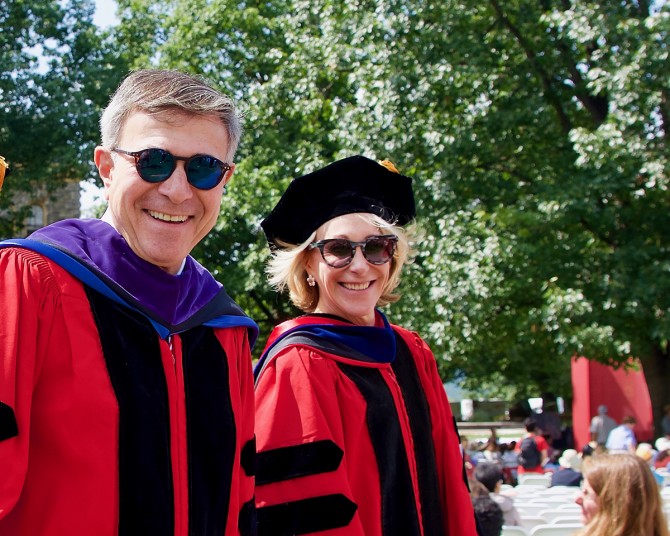
Jan Rock Zubrow ’77, chairman of the Executive Committee of the Cornell Board of Trustees, and Robert S. Harrison ’76, chairman of the board.
Cornell's trustees aim for the university's long-term health
By Joe Wilensky
Robert S. Harrison ’76 has been a member of Cornell’s Board of Trustees since 2002 and became chairman in 2012; he also serves on the Weill Cornell Medicine and Cornell Tech boards of overseers. He previously chaired the board’s Executive Committee and Student Life Committee; as an undergraduate, he served as a student trustee from 1975-76.
Jan Rock Zubrow ’77 has been a member of the board since 1998 and became chairman of the Executive Committee in 2011; she has also chaired the past two Presidential Search Committees and was co-chair of the Cornell Tech task force.
How does the work you do on the board translate to the health of the university, and how do you define success in your roles?
Harrison: The board’s role is to make sure that the university thrives in perpetuity. With every decision, we need to take the long-term view of what is in the best interest of the university as a whole. That means we need to select a great president, be supportive of his or her agenda, and provide unbiased advice to guide the university’s strategic direction. We also need to be vigilant in monitoring the university’s risks, growth and financial security.
Zubrow: As fiduciaries, we have a responsibility to make sure that the board and the university are acting in a way that’s consistent with our mission and our core values. We are, in effect, the moral compass of the university, and we want to make sure the university is operating with integrity.
We measure our success by looking at metrics that relate to our three-part mission of teaching, research and public engagement. We look at research standings, internal reports on campus climate, faculty and student satisfaction, and diversity, as well as university rankings. These metrics and reports help us assess how we are doing as a university relative to our mission, goals and values.
What are some of the most significant issues the board has faced during your tenures?
Harrison: Among the most important was transforming the residential experience for undergraduates, including the creation of a freshman community on North Campus, an upperclass residential college experience on West Campus and, recently, the decision to expand North Campus to create a new community for sophomores.
A second significant issue was the expansion of Cornell’s presence in New York City – Weill Cornell Medicine, Cornell Tech and numerous other college programs – to become a two-campus university. In addition to investing in the medical college, we made a game-changing decision to pursue and then create Cornell Tech on Roosevelt Island. If we invest in this opportunity as we should, Cornell Tech will enhance the stature of the entire university for decades to come.
A third and persistent issue is maintaining the financial strength of the university, particularly during difficult periods like the Great Recession. That financial strength is what permits us to invest in our faculty and our students.
Zubrow: The investment in the Belfer Research Building in New York City is a very big deal. Historically, our expertise at Weill Cornell Medicine has been on the clinical side of medicine, but we recognized that to go from “good” to “great,” we needed to have a significant research enterprise. Given the importance of the medical college to Cornell’s mission, we need to work hard to continue its success.
Harrison: We actually took on several hundred million dollars of debt during the recession [in 2011] to build the Belfer building to lure some of the world’s greatest investigators – physician-scientists and others – to dramatically scale the research mission at Weill Cornell. That was a very gutsy thing to do at that moment in time.
Zubrow: Similarly, the decision to create Cornell Tech was a transformative moment in the life of the university. I think it will change the trajectory of Cornell forever. Cornell Tech is training the next generation of leaders of the digital economy with a new approach that combines technological education with entrepreneurial training. We expect our work will have a big impact on New York City and create new opportunities for the entire university.
What is something each of you has learned from the other while serving on the board?
Zubrow: Bob has been an extraordinary leader of Cornell through some very difficult times, and by working with him, I’ve learned how to lead under enormous pressure. Bob stays calm, focused and sets the right tone for the university and the board. He works tirelessly and collaboratively with Cornell’s leadership and the board to always do what’s right for the university. It’s never about him … he views every problem through a lens of Cornell’s mission and values.
Harrison: With Jan, I’ve learned how to be an effective partner within a somewhat unusual leadership structure. In most organizations, the chairman of the board is also chairman of the executive committee, but Cornell has a tradition of splitting those roles. That could create all kinds of friction, but we have never had that in the entire time Jan and I have been working together. We have listened to each other and have totally respected each other’s views; I’ve changed my mind as a result of hearing from Jan, and my guess is that she has, too. We really have become fantastic partners, and I believe it has benefited Cornell.
How does the board’s democratic and representative makeup reflect Cornell’s culture?
Harrison: We are the largest and most democratic board of any Ivy League college, and we’re also large compared to other public and private college boards. The average size of a private university board is 29, and for public universities it’s 12. Cornell has 64 board members who represent our incredibly diverse history. We have representatives from the agricultural community, the labor community and state government, as well as representatives from the faculty, the student body, employees and alumni. We’re unique in the diversity of our governing body. And we’re a board that listens to each other before making decisions.
Zubrow: Our democratic approach to governance stems from our heritage and shapes our unique culture. It’s part of our DNA. We live and breathe these core values through the broad representation on our board and how we make decisions.
We are a truly democratic university, and we have a much broader view of what it means to be an academic institution. Our public-private mission and the value we place on both the liberal arts as well as the applied fields – and the belief that those are equally important – colors everything we do. I think that is the richness of our culture.
How has trustees’ focus on the long-term interests of the university proven crucial to decision-making?
Zubrow: Having a big-picture, long-term view is central to the most important decision that the board makes: the selection of a president. To provide broad input, we constitute a committee with representatives from different constituencies: trustees, faculty members, students and employees. When we come together, one of the first things I ask of the committee – and what I tell them again at the end when we are about to vote – is that you put on your “university hat” and vote as a citizen of the university. When it comes to the final vote, the committee members make their decision based on what’s right for the university, and not based on the views of a narrow constituency.
Harrison: Our decision to create the Cornell SC Johnson College of Business is the single best example in my experience of trustees focusing on the best interest of the university rather than being protective of their individual colleges.
We have always had trustees who were very strong advocates of the Hotel School, the Johnson School and the Dyson School. They attended those schools and have been fiercely loyal and supportive for decades. Integrating those schools into a unified college of business was the single most contentious issue that we faced during my tenure on the board. At the end of the day, the decision was unanimous, and part of the reason it was unanimous is because of the advocacy of people who put the university’s long-term interests above all else.
What advice would you give a Cornell student today?
Zubrow: The advice I always give to students is to follow their passions and to be true to themselves. I encourage them to pursue majors and careers that fit their interests and not worry about fulfilling other people’s expectations of them. I believe that you’ll only be truly happy and successful at something that you love.
For young women, in particular, I advise them to be confident in themselves. I find that young women are often too critical of themselves, and sometimes a lack of self-confidence causes them to miss opportunities. Men don’t seem to suffer from this affliction, so I frequently tell young Cornell women, who have every reason to be confident in themselves, to put themselves out there.
Harrison: Three things: One, get to know people who are not like you. I grew up in a relatively homogeneous environment, and when I first attended Cornell, I was struck by its diversity – and we’re much more diverse today than we were in the mid-’70s. Take advantage of it.
Second: Do things, both academically and extracurricularly, that are new to you, that are completely different than what you’ve done before.
And third: This is really important in the current environment – go to lectures or presentations by people with whom you disagree. If you’re leaning toward the more liberal end of the spectrum, go listen to speakers like Rick Santorum, Newt Gingrich or Dick Cheney when they come to Cornell, and be respectful in the audience.
Cornell alumni vote for two alumni-elected trustees each year. How would you answer the question ‘Why should I vote?’
Zubrow: We have alumni-elected trustees on our board, and that’s a very unusual thing. If you’re an alum and you want to have a voice in the governance of the university, this is your opportunity; you shouldn’t pass that up. It is your right, and you should express that right. We get some of our best trustees from our alumni-elected trustees – both Bob and I started as proud alumni-elected trustees.
Harrison: The board of trustees is extraordinarily important in setting the future course of the university, and an alumni-elected trustee has exactly the same role to play as any other trustee. I think that voting is the very least an alum can do to give back to Cornell. While we love to see alumni devoting their time, expertise and financial resources to Cornell, voting for alumni-elected trustees is the easiest way to start getting involved, reconnecting and making a difference.
Media Contact
Get Cornell news delivered right to your inbox.
Subscribe




